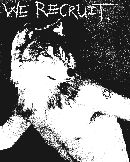
GAY MARRIAGE?
Growl...
Don't groan: organize!
Making change: with just small change.
And big dreams.
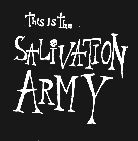
Army of lovers
From fierce little 'zine to
award-winning film
"A tale of blood, sex, spit, spunk & cult recruitment" -- winner of the 2002 InsideOut Film Festival's Colin Campbell Award for Best Gay Male Documentary Short.
For more, go cruise:
The Official Web Presence
of Scott Treleaven &
THE SALiVATION ARMY
http://www.scotttreleaven.com
-
"Galvanizing the Queer Movement has Changed the World, so don't listen to anyone who says you can't. But when the movement stopped making things better & began to crush everyone with assimilation tactics, we decided to get out of it. After all, 'We are all here to GO.' And we are all here waiting for you.
"ONLY THE RESTLESS ARE FREE"
"Perverts Rule," by Scott,
in This is the Salivation Army, Issue V
We recruit.
It's a too common charge of the raucous right: "Homosexuals can't reproduce. They seduce!" Kids they mean, mostly. It's an accusation to which, proudly, I confess. Not that I get into kids' pants. (Well, very few; just one maybe not quite yet 17. And that was ages ago.) But I love getting into their heads: young people finding their own place in the world -- and the power they have to shape it -- turn me on.
I don't mean just kids struggling to "come out" as "gay." Those terms are cheap formula -- as if there's some neat "identity" deep inside each of us, already fully formed, just trying to work up the nerve for that one dramatic, definitive moment: "Coming Out!" To "Gay Life!" -- also fixed, fully formed, these days neatly tagged: the same bright flag flying everywhere. (Well, anywhere it's safe.)
"Coming out," hoping to fly "Somewhere over the Rainbow," kids landing in Oz before they're "of age" often find Gertrude Stein's Oakland: "When I got there there was no 'there' there." Just endless (and endlessly banal) rainbows. A friend of mine made a video that he once told an audience:
- "was created as a direct reaction to the fact that, as a young fag, the thing most likely to have driven me to suicide was not 'straight culture' as everyone would have you think, but the gay mainstream...."
That "young fag" was Scott Treleavan. The video was called Queercore. He has since made a film: This is the Salivation Army. That's why I'm telling you about him: Scott, still young if no kid (he's just turned 30), has some hopeful lessons to teach us on the Tedious Issue front.

No resources,
no credentials -- & no permission
Premiere issue of a rag that grew, October 1971
"Their purpose was not to start a paper. It was to create a way to refine, broadcast and advance political aims. The means they chose, ink on newsprint, was of venerable activist repute. But that's not why they chose it. It was all they could afford.
"It was a political project casting itself as a 'newspaper.' No one there was a 'journalist.' They were political activists, caught up in a movement for sexual and even broader social liberation."
From fierce little 'zine to voice in a vast social movement. See:
On the Origins of
The Body Politic
http://www.rbebout.com/
oldbeep/beepint.htm
The Salivation Army -- "a rag-tag gang of queer revolutionaries," a sex crazed kid wolf pack -- was in fact little more than Scott, a few dearly loved comrades, and a Xerox machine. They had little to go on -- but burning desire. They wanted to connect with other "restless queer punk youth."
They did. In a 'zine, that cut n' paste genre as much a mark of their times as manifestos were in the radical days of the fading Sixties. Issue 1 of The Body Politic, calling itself a "gay liberation journal," first hit the streets on Halloween night 1971 as little more than a collection of manifestos. Showing that issue to a friend not yet born in 1971, he said: "It looks like a 'zine!" It became an institution.
One that formally survives, as Pink Triangle Press: publisher of Xtra in Toronto and its siblings in Ottawa and Vancouver. (The Body Politic died in 1987; its radical vision barely survives.) Out wandering a "gay village" full of institutions, helping kids in three Buddies in Bad Times Theatre Summer Youth Projects, I imagined them thinking: This is all so big, so established -- way bigger than I am; I could never make anything like this happen.
Learning of The Body Politic, they'd ask how it happened. It took me a while to figure it out; that story, too, seemed dauntingly big. I finally got it down to a few words: It began with just a handful of people who had almost no resource, no credentials, and -- most vitally -- no permission. All they really had was passion. And faith.
- "We would teach each other how to be focussed, skeptical, strong-willed ... conscious. One night he looked into my eyes and said: I want to focus all this reasonable, righteous anger. I want to wake up once and for all."
From This is The Salivation Army, Issue 9 (the film)
This is the Salivation Army, that queer wolf pack's brazen little 'zine, was spared institutional sclerosis. It got shelved in the late 1990s after eight issues; the film is Issue 9. "What began as a small, local gang," Scott says on his site, "transformed into an increasingly dangerous cult network."
Scott once said to me: "I'm big on accountability" (warming my heart: he's clearly an activist, not a "journalist"). His film -- "a vicious, erotic and instructional cut n' paste portrait of the underground" -- he has called in part "a confessional," his accounting for "teenage wet dreams."
But he dared dream. And still does, passionate to makes things happen, dying for the vital conversation that is the beginning of how things happen. He wrote in Issue III:
- "Only the defeated have no thoughts on REVOLUTION. The SALiVATION ARMY -- It's a start. You might be saying 'revolution? what the fuck are they talking about?' Quite frankly, we're open to suggestions."
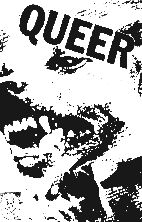
"Wolf families are affectionate and co- operative. They play and hunt together. They protect each other too. If one wolf gets into trouble, the others will try to help it. You will not often see a wolf on its own."
This is the
Salivation Army
Issue III
Gay Liberation, like all grassroots movements for social change, began as a bunch of rag-tag gangs: small groups fired by "reasonable, righteous anger." And often by mutual affection: they worked for love, not money; only a handful ever made a living at it -- by making it their lives for nothing like a "professional" salary. (For nearly a decade I was among those lucky few, paid at first all of $8,000 a year.)
They were very much open to suggestion: they spent most of their time talking -- tossing around thoughts on how to turn talk into action. Among their first acts, quite often, was trying to spread that talk around.
For that it helped to have profile, a visible presence. Their groups needed names. (The gang who made that little gay mag in 1971 didn't call themselves anything -- until they had to put a title on its cover; they were named for it: The Body Politic Collective.)
For easy talk or neat lapel pins it helped if that name made a snappy acronym. ASK, CHAT, GATE, GO, HALO, LOOT. Even LOON and APPLE. These tags (TAG among them) could serve as code: T-shirts touting "Men 4 Men" or "1 in 10" or " 2Q2BSRT8" were not yet a casual fashion accessory. Or as an opener: GO where? ASK me. I'll CHAT. And they fit into the media's tight "headlinese" -- even if, for a very long time, just in our own little mags and newsletters. (And hey: they were fun to think up). *
Some of these groups got pretty big. And there were lots of them: by the 1980s hundreds of grassroots organizations all across Canada, not just in metropolitan meccas but in many small cities and towns.
But many stayed small. (Especially those seen as packs of "political activists" -- even as people all over were wildly active, and all of it was politics: coming together; sharing power to shape the world we want.) Still, some had big effects. Toronto Gay Action (that's TGA) was never much more than a dozen people: it was they, starting with almost nothing but passion, who gave birth to The Body Politic.
It's true: A handful of people, sharing talk and passion and care, conversation growing to commitiment and then to action, can actually change the world.
That historical truth is lately unfashionable. To many it seems pie-in-the-sky: unrealistic, unprofessional, amateur, hopelessly naïve. Even pathetic. And tiresome: earnest urgings to a long grim slog against "reality" -- the inevitable hype, the glittering façade, the sheer "Gonna Be a Rock Star" glamour of the New Corporate World Order.
But it's still true. And the world where it can happen -- the everyday world of you and your friends just talking; citizens in public conversation hashing out what they might do -- is still, very much, the Real World. And let me tell you: There's nothing grim about waking up to your own power.
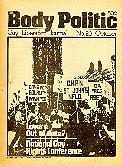
A national gay movement
A real one: 1975 Ottawa demo, during the third countrywide confab, founding the National Gay (later Lesbian & Gay) Coalition.
For a brief overview of gay activism across Canada, growing from the grassroots if linked in common cause from 1973 to 1980; some later national and even international fests; to EGALE "marching on with a battle cry long heard in the US if not [yet then] in Canada: "On to Gay Marriage!" -- see a sidebar near the end of:
Promiscuous Affections: 1980
http://www.rbebout.com/
bar/1980.htm
See what matters now:
Egale Canada
http://www.egale.ca
Those many groups, small and biggish, were rooted in local communties all across Canada. But they found ways to join their many voices in common cause. From 1973 this country had a true, locally based, pan-Canadian and often quite radical gay and lesbian movement. It pooped out in the early 1980s. Local activism survived, but never regained the vital edge or the national scope it had shaped in the 1970s.
In 1986 we got EGALE: Equality for Gays And Lesbians Everywhere. It rose not from visionary grassroots activism, but cautiously polite lobbyism. Born in Ottawa, it stayed there. It is not a coalition of groups across the country: it has members elsewhere but they do not represent local organizations or communities.
EGALE is, as were most early gay groups, not huge; it's lobbyist core is small. It is not, unlike many before, a pack of impassioned amateurs, not in the least "unprofessional": its key players are lawyers. It's mostly sober, well-spoken guys in suits (and some nicely suited women) -- not in any old-fashoned silly sense "gay"; that wouldn't fly on The Hill. I don't think many get paid. But the lobbyist's life has other rewards: some clearly get off on proximity to Parliamentary power.
And they've got profile. Those few people are now "the national gay movement." Or so the media tell us. It is not any longer a radical movement. In 1999 lawyer Brenda Cossman, writing in Xtra, noted EGALE's disdain for distasteful issues: censorship; age of consent; draconian laws against "child pornography." Her article was titled: "No sex, please: national lobby group stands up for respectable rights only."
They have since been convinced to get behind Little Sisters' high-profile slog through the courts, the Vancouver book store challenging censorship by the border guards at Canada Customs. But EGALE still has just One Big Issue. Of more than 60 items listed on their website's first page, going back to 1999, maybe half a dozen deal with issues beyond "spousal" status and wedding bells.
Don't expect them to get any less respectable. In 1999 the feds pondered raising the age of consent. It has long been 14 but for sex linked with likely abuse of power; before 1988, for "buggery" and "gross indecency" (guess whose), it had been 21. EGALE, their sole aim mere "equality," wondered whether to intervene. As long as all kids are equal -- their lives equally limited by law -- well, what's the problem?
Raising the age of consent would have serious affects on sex education, disease prevention, birth control and, not least, the erotic awareness and self-determination of more than a million kids, queer and otherwise.
EGALE didn'take a position. Instead they offered the feds a few "points of concern." You can find them on their website: just key "age of consent" into its nifty search option. You'll also find their 1999 online survey on the issue, seeking "input": 14? 16? 18? -- have your say! I did not discover what anyone might have said.
To quote Scott again, this time to sponsors of that screening of Queercore, the glossy "gay youth mag" XY -- avidly selling boys (just boys; baby dykes don't cut it in the fabled "gay market") to Nike, Calvin Klein, and The Gap:
- "YOU DON'T REPRESENT US. YOU DON'T EVEN KNOW US."
Let's take a lesson from Scott: A few suits on The Hill do not represent (and clearly don't know) "Gays and Lesbians Everywhere." They do not speak for us. We -- whoever "we" may be -- can speak for ourselves.
And let's take lessons from history: "We" have never spoken with just one voice. The gay movement was born of cacophony, of voices wildly various. Some dared dream, their hopes visionary: they wanted to change the world. Others urged caution, careful "strategies" tailored to "popular appeal." Some of them too wanted to change the world -- or at least a few laws -- but we must, they said, be "realistic." Even "respectable."
Many gave up hope for a better world, settling for "acceptance" as a "minority" labelled "gay" -- by a world otherwise no more humane. For anyone.
It's time we dared, again, to dream. Some of us at least: let strategists be "realists" (and even dreamers can have strategic moments: what's more realistic than urging the feds to heed a federally commissioned report?). But let's raise visionary voices too. Let's give bright dreams some profile. And let us -- like those little rag-tag gangs who birthed a vital movement -- dare to have some fun.
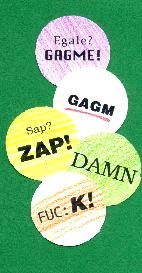
Not hiding
More on The Hidden Cameras' communal cacophony:
Bodies unbound
Gay marriage mavens, and gag-making sanctimony, have got EGALE. Let's GAGM back: Gays Against Gay Marriage (though I've never liked "gay" as a noun). Or SHAGM: Smart Homosexuals; more inclusive if a bit retro. Or SLAGM: Smart Lesbians, maybe separatist....
It's catching. Activist historian Steven Maynard sent word of a Kingston corps: GAMGE (and they do): Gays Against Gay Marriage Everywhere. Why not? EGALE claims sway "everywhere." It might really take off (like AAN! -- AIDS Action Now!) as GAMGE! Against Gay Marriage MAVENs (Maritally Approved Values for Everyone Now) let's launch RAVEN! -- Repeal All Value Enforcement Now! Or maybe Radical Activists (or Anarchists!) Versus Egregious Nuptials....
On the smarm front: How about ZAP! Zip All Pomposity! Or FUC: K, Forsake Unctuous Crap: Know. Gerald Hannon, ancien combattant of Gay Lib, says DAMN: Dinosaurs Against Mandatory Nuptials. And then there's GAY (not in the solemn PC sense, but one much older: "rakish, libertine, given to lighthearted pleasure"): Gay Against Yuk. Gerald tossed me GAI, a bilingual version, at least acronymically: Gay Against Ick. Even (icky bureaucratic) LGBT: Let's Get Beyond Tedium.
I could go on. (I'll bet you could too.) And some already have: not a tag, but logos. I lately got handed some, made by hand. On the back was an invitation:

|
The Hidden Cameras play the
Let 'Coupledom' Die Show! "We're not fools to fall in love, but let 'coupledom' die. Ban marriage." Saturday October 12, 2002, 8 pm Victoria College chapel, 91 Charles St W, Toronto "The tones and drones of gay folk church music" -- free |
I don't want to ban anything. (But hey, that's cacophony for you. And we need it.) I don't really want to gag or slag anybody (let alone shag anyone at EGALE). And yes, all this is silly. As W H Auden once said: "Silly like us." It's time for some play -- brazen irrerverance, sheer silliness -- in the face of solemn and self-righteous smarm.
And (seriously folks): Play is a way to grow. Just ask any smart kid.
"PLAYS
WELL WITH
OTHERS"
(With apologies to author
Allan Gurganus...)
Talk amongst yourselves!
You don't have to join anything. You don't have to endure ritual scarification as recruits of the Salivation Army. You don't face confabs with 9 am plenaries (the movement too often not gay enough!). You won't have to examine any briefs (but those you want to).
All you need is desire, imagination, and maybe a sense of fun (if you've got spare change and can get badges made, you could even get silly). And conversation. You've likely got a group already: friends. Talk. And spread the word: put others onto issues beyond gay marriage, to Beyond Conjugality (and I hope to this website).
Especially friends living in pairs, conjugal or not: let them know what fate may await -- and ask what they might like to do about it.
Spread talk even further
Get your ponderings out there (well, as far out as this website may go). Send comments, thoughts, reflections, rants, to me by e-mail: there's a link at the bottom of each page. Say in the subject line what you're on about. Or just say "Get Free."
Let me know if I can post your ideas in the section here called "Voices." Or "Culture Wars." Or any new sections your talk may inspire. Let me know if I can use your name. And / or your e-mail address -- to extend conversation beyond this site.
For other play (some maybe more sober), see:
What you can do
Get informed / Get talking / Get heard
See more on:
The Buddies in Bad Times Summer Youth Projects, in Promiscuous Affections, 2000.
* For the record: ASK: Association for Social Knowledge (Vancouver, 1964 - 1969). CHAT: Community Homophile Association of Toronto (1970 - 1977). GATE: Gay Alliance Toward Equality (Vancouver, 1971 - 1977; Edmonton and Toronto pretty much ditto). GO: Gays of Ottawa (1971 into the '90s). HALO: Homophile Association of London Ontario (1974 and long onward). LOOT: Lesbian Organization of Toronto (1976 - 1980). LOON: Lesbians of Ottawa Now (at much the same time). TAG: Toronto Area Gays (begun as a help line in 1975; later, with Lesbians, TAGL).
APPLE, the Atlantic Provinces Political Lesbians for Equality (c 1976 - 1981) had a change of name. And aim: after talk about "equal to what and all that stuff," wanting to focus instead on the kind of world they hoped to create, they said their final "E" stood not for "Equality" -- but for "Example."
For endless activity, communal creativity (and lots more alphabet soup), see Tom Warner's Never Going Back: A History of Queer Activism in Canada (University of Toronto Press, 2002) and Don McLeod's Lesbian and Gay Liberation in Canada: A Selected Annotated Chronology, 1964 - 1975. For details on Don's book -- and vast historical treasures -- see the website of the Canadian Lesbian & Gay Archives (http://www.clga.ca).
Rebels with a cause -- & a cause without rebels
(Culture Wars: Contents page)
Ideas in play (Main list of contents)
Spouse touting (Introduction)
Gay marriage? Wrong question (Lead page)
My home page
This page: http://www.rbebout.com/getfree/recruit.htm
October 2002 / Last corrected: October 21, 2003
Rick Bébout © 2002 / 2003 / rick@rbebout.com